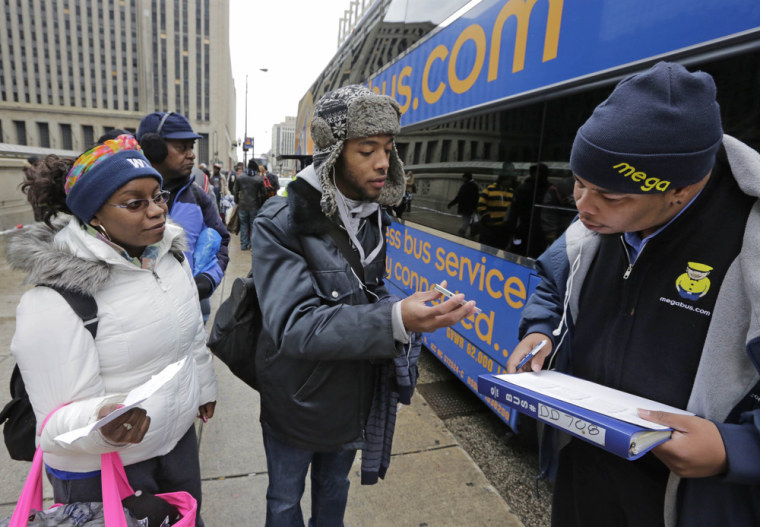
As millions of Americans hurtle through the jumble of transportation arteries for Thanksgiving, many are discovering that bus travel may be the cheapest, comfiest and even coolest way to stay Zen during the nation's largest annual migration.
After nearly half a century of decline in the bus industry, a new breed of sleek, Wi-Fi-pumping intercity coach is transforming the image of buses as the much-ridiculed travel option of last resort. With free Internet connections, tickets as cheap as $1 and decent legroom, companies such as Megabus.com and BoltBus are luring holiday travelers disenchanted with the hair-pulling rituals of airports and driving.
"I've been doing it for a couple of years and it is a nice ride," said theater student Natalie Sienicki, 22, sitting inside a blue double-decker Megabus idling on a windy, snowy street corner near the grand colonnades of Chicago's Union Station.
Her journey on Tuesday was not only cheaper than flying ($56 roundtrip) but also took her all the way to her destination in Ann Arbor, Mich. If she had traveled by air, Sienicki would have had to make a side trip through Detroit.
The new bus services are capitalizing on generational and technological shifts: younger urbanites are espousing a car-free lifestyle, and gadget-wielding travelers of all ages increasingly expect to buy tickets online and stay connected for the duration of their trip.
"Young people have no great psychological connection with the car," said transportation trends researcher Joseph Schwieterman of DePaul University in Chicago. "They just want to get from Point A to Point B, and being able to use their electronic device on the way is a bonus."
Many new bus carriers offer free Wi-Fi and have electrical outlets at each seat. Megabus.com has slapped GPS tracking devices on its fleet of 300 double-decker buses, allowing travelers and the people waiting for them on the other end to track the trip in real time with a smartphone app.
"Those kinds of things we feel really matter," said Mike Alvich, Megabus.com's vice president for marketing. Such innovations along with the prices, he said, are why Megabus.com has enjoyed so much success pulling people out of their cars. The company says 30 percent of its customers are people who otherwise would have taken a car for the same trip.
In another technological leap, new companies such as Wanderu have emerged to become the Expedia or Travelocity of buses, offering deal-seekers the chance to compare prices.
The industry is using a demand-driven pricing model common to airlines and hotels but with a much lower starting point: as little as $1. Prices go up the closer you get to the date of travel and as the bus fills up, but for someone traveling alone a last-minute booking is often still cheaper than driving.
The companies are able to offer such cheap seats because their online-only booking systems save them from having to staff ticket offices. Operating from curbsides rather than bus terminals also keeps costs low.
It also helps that the typical 18- to 35-year-old passenger barely remembers the bad old days of bus travel. That image problem endures for older travelers who braved interminable bus trips that launched from seedy downtowns, included numerous stops and were often punctuated along the way by the — let's call them eccentricities — of a fellow passenger or two.
"I had visions of 'Midnight Cowboy,' but this is nice," 31-year-old Andy Dale joked, referring to the movie in which Dustin Hoffman's character dies of an illness on a bus journey. But his Michigan-bound Megabus was a lot more comfortable than he'd imagined, Dale said.
There's even a touch of razzle-dazzle from companies like Lux Bus America, which operates in southern California and goes to Las Vegas. It bills itself as an "airline on the ground." Its fleet has leather seats with comfy headrests and seatback entertainment systems. An attendant serves up beverages, snacks, pillows and blankets.
The bus rebirth began around 2006, when Megabus.com, which first started in Britain, entered the U.S. market in Chicago. It now operates in 120 cities in North America and hit 30 million customers in September.
Buses are now the fastest growing form of intercity travel in the U.S., according to a study released this year by DePaul's Chaddick Institute for Metropolitan Development.
The study found that service by discount operators rose by more than 30 percent from 2011-2012. The 2013 numbers are still not in, but Schwieterman, who co-authored the study, expects the sector's scheduled operations to top 1,200 for the year.
No baggage fees, security hassles or limits on using laptops are some of the reasons the companies are drawing more passengers like Alex Leopold, who said she'd rather take the nine-hour Megabus ride from Chicago to Nashville than fly.
"This is reliable, and there aren't any layovers," the 20-year-old DePaul advertising student said, an ear bud dangling from one ear as she waited to board.
The traditional Greyhound service also has rebounded somewhat after decades of cuts. It spun off the BoltBus brand in 2008 to get into the discount game.
BoltBus General Manager David Hall says he has been blown away by its success.
"It's a bit overwhelming, quite frankly," Hall said. "... You get people who haven't ridden the bus in years, and yet they're coming down to give us a try because they've heard it's cool."
Associated Press writer Don Babwin contributed to this report.